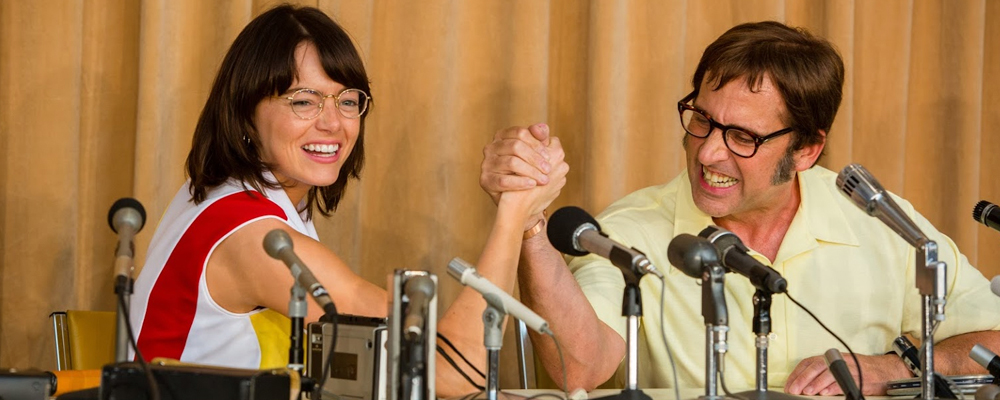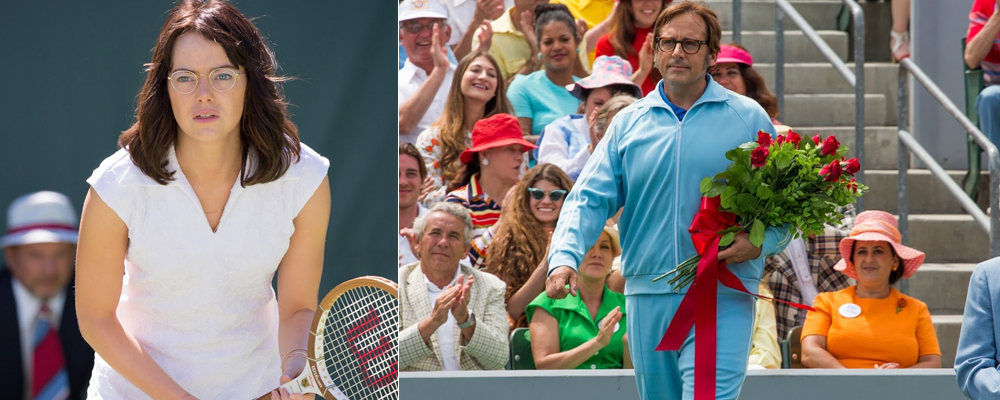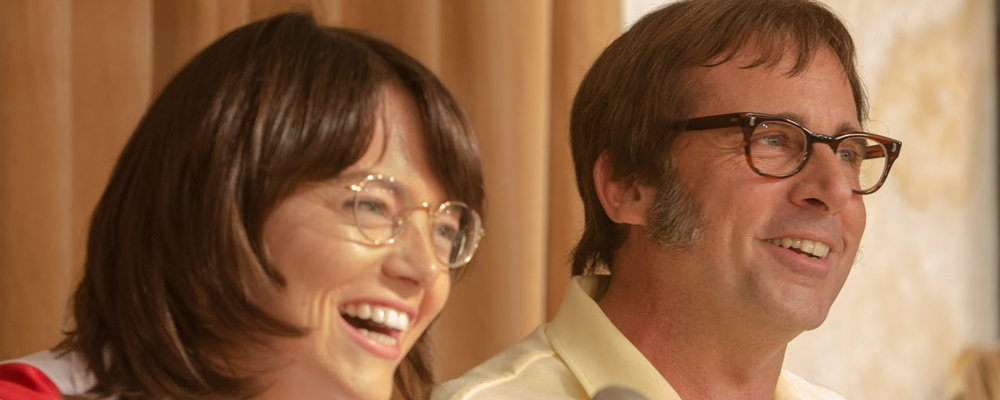Emma Stone and Steve Carell Are a Winning Pair in ‘Battle of the Sexes’
Sandra Miska
With an Oscar now on her shelf, Emma Stone takes things to the next level as one of the greatest female athletes ever, tennis star Billie Jean King. King, who won 39 Grand Slam titles in her career and has been active promoting LGBT rights in recent years, is best remembered by many for taking down self-proclaimed chauvinist pig Bobby Riggs in the 1973 televised exhibition match known as “Battle of the Sexes.” In the new film of the same name, Steve Carell co-stars as Riggs, King’s sparring partner on and off the court. While the Battle of the Sexes match is remembered as a feminist victory, something that is depicted in the film that a lot of people don’t realize is that the match was initiated by Riggs, a man whom it would almost be understatement to call a showboat. Husband and wife directing team Jonathan Dayton and Valerie Faris, the duo behind “Little Miss Sunshine,” along with “Slumdog Millionaire” scribe Simon Beaufoy, get to the heart of these characters and what makes them tick.
Introduced at the top of game, Billie Jean, age 29, and her fellow female tennis players face obstacles because, surprise, surprise, they aren’t getting paid as much as their male counterparts. With the support of “World Tennis” magazine founder Gladys Heldman (a sassy and regal Sarah Silverman), she makes demands to tennis promoter Jack Kramer (Bill Pullman), her real adversary in this story, and after he refuses, she, Gladys, and her fellow female players found their own tennis team and hit the road on the a tour sponsored by cigarette brand Virginia Slims (remember, it was the seventies).
Meanwhile, Bobby, now 55, a once great player, faces financial troubles, not in the least due to his gambling addiction. After his long-suffering wife, Priscilla (Elisabeth Shue) kicks him him out, he gets the idea for Battle of the Sexes match, seeing it as a quick payday. Billie Jean initially says no thanks, leading him to challenge another woman, Aussie Margaret Court (Jessica McNamee). After she chokes, Bobby is thrilled with the money and publicity, but Jack, a true misogynist, takes it a step farther, seeing it as victory for all men fed up with feminism and proof once and for all that women should take a step back, not only in sports, but also in business, politics, etc., motivating Billie Jean to call up Bobby to tell him game on. While Bobby may have been financially motivated more than anything, here we see that it became something more personal for Billie Jean.
“He created a character,” Carell said of Riggs at a recent press conference. “I think he saw what was in the zeitgeist. I don’t think he cared much about politics. I don’t think he had a foot in feminism or chauvinism. I think he just wanted to make some dough and promote himself, and he wanted to be famous…. You could tell that all these things he was espousing weren’t connected to his heart, and I think that was part of his charm.”
“Battle of the Sexes” also deals with Billie Jean coming to terms with her sexuality as she falls for hairdresser Marilyn (Andrea Riseborough), despite being married to living Ken doll Larry (Austin Stowell). Billie Jean takes Marilyn on tour with her, and while there are some whispers, especially from homophobic Margaret, this causes little conflict, at least externally, as the almost too perfect Larry makes few complaints. One bright spot in this subplot that at times feels somewhat flat is Alan Cumming as Ted Tinling, the openly gay designer who offers Billie Jean support, as Cumming allows some of his own personality and charm to shine through here.
Cumming described Ted as being something of a fairy godfather to Billie Jean. “I personally find that I have a healthier, more sane life, and I feel most people do, if they are able to be who they are and they don’t have to hide and lie and pretend to be someone they’re not, so that’s something I always encourage people to do,” said they actor when asked about playing the man who gives Billie Jean hope that someday she will be free to be herself.
The best scenes here are really the ones involving the big match and its lead up, as Dayton and Faris highlight the differences between the cool and collected Billie Jean and ringleader Billy. The case is made that in a way, losing is what Bobby really needed to put things in perspective and get his life in order. Stone and Carell are both at the top of their respective games here, with Carell pulling in equal parts humor and heart, and Stone channeling Billie Jean, who was really more of an athlete than the “angry, hairy feminist” Bobby initially sees her as. “Is your mother better than your father?” She asks one guy accusing her of trying to prove that women are better than men, proving that at the end of the day, equality and respect are what’s important.
Both Bobby and Billie Jean experience emotional releases at the end, and Billie Jean’s is especially poignant as she is shown crying by herself in the locker room post match, because even after this major victory she is still experiencing unhappiness and conflicted feelings due to her not being able to be herself.
Emma Stone opened up about that climatic moment. “Because she has such strength, and because she holds it together and it’s all underneath the surface for most of the film, that sort of breaking point, you have to earn that moment of finally seeing everything that has been happening under the surface the whole time, because she was on four hours of sleep every night and all of this was going on with Marilyn and with Larry… In that moment, after winning it was pivotal to me, certainly as an actor, to be know that this is where we were building to.”
“I thought Emma absolutely portrayed it one hundred percent right,” said Billie Jean King of her onscreen counterpart at that moment in time. “It was so touching when I saw it. It was so authentic to what was in my heart at the time.”
“Battle of the Sexes” opens Sept. 22 in Los Angeles and New York, expanding nationwide Sept. 29.



